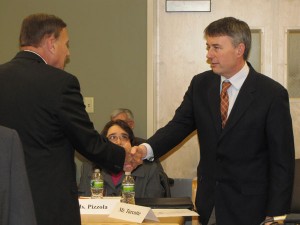TCAT has made strides over the years to build ridership to an all-time high and gain strong support from the community.
Unfortunately, the ability to keep up that momentum achieved over the last several years has been threatened by a lack of adequate funding. It is important to note that fares only make up about 32 percent of TCAT’s revenue stream. The rest comes from local, state and federal coffers.

Funding from Cornell University, Tompkins County and the City of Ithaca has remained flat for the past four years as those entities have fiscal challenges of their own. For the third straight year in a row, state aid — TCAT’s largest single source of financial support — has been significantly reduced. At a time when ridership is at nearly 4 million annual trips, this past month TCAT was forced to raise fares and reduce service. We are telling passengers they can expect more of the same in 2013.
That will serve to unravel a system that many here at TCAT and in the community have worked hard to build. What is particularly bittersweet is that in 2011, TCAT was named the No. 1 transit agency of its size in North America by the American Public Transit Association.
Recently, we learned about the proposed American Energy Infrastructure Jobs Act of 2012 (H.R. 7). This legislation would eliminate dedicated federal fuels taxes for public transit for the first time in 30 years. Since 1983, nearly half of all public transportation funding has come from the federal motor fuels taxes. This funding structure has provided highway and transit programs with secure revenues and has allowed public transit systems around the country to create jobs and foster overall economic growth.
It all seems so counterintuitive, particularly when gas prices are expected to go back up to $4 in the coming months. For many people, public transit is their sole source of transportation to get to their jobs and school.
Last fall, Ithaca College approached us and worked with us to beef up late-night service for IC students from downtown to campus. We applaud college leaders for their efforts to help fund and provide their students with an environmentally friendly, affordable and safe transportation alternative. We are happy to say the initiative has been a tremendous success. Dismantling the TCAT system counteracts any positive effects of forging such partnerships and threatens their success.
We were relieved recently when we learned that clearer-thinking heads in Washington are helping to thwart what has been reviled as the most backward transportation bill in U.S. history. We were happy to learn that U.S. Rep. Jerrold Nadler, D-N.Y., along with a slew of Democrats and Republicans alike, introduced an amendment to return motor fuels tax revenues to public transportation.
Still, there’s a lot of work to be done to make sure all Americans have reliable, safe and affordable transportation. Consideration of H.R. 7 has been delayed until after Congress returns from the President’s Day district work period Feb. 27. In the meantime, let your voices be heard and support the Nadler bipartisan amendment to fight a transportation package that, according to Transportation Secretary Ray LaHood, a former GOP congressman, “takes us back to the dark ages.”
Joe Turcotte is the general Manager of TCAT, Inc. Email him at [email protected].







